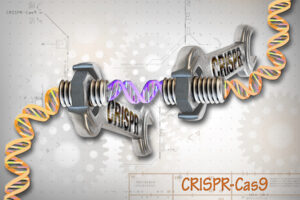CRISPR (Clustered Regularly Interspaced Short Palindromic Repeats) is a sophisticated genetic technology which can engineer changes in the DNA blueprint of plants and animals. History was made in 2023, with the launch of a salad blend made from the first genome-edited plant product using CRISPR. Purple and green mustard greens, naturally bitter to the taste but with a higher nutritional value than lettuce, were gene-edited to remove the bitterness. The result tastes more like lettuce, while retaining its original nutritional content.
The potential for the generation of genetically modified plant organisms (GMOs) appears endless. It could, for example, protect the struggling global chocolate supply by developing virus-resistant cacao. Allergen-free peanut butter could even bring PB&J back onto school lunch menus. Experts hedge their excitement about CRISPR-edited foods, however, because of public fear that GMOs will ultimately be shown to have harmful environmental and dietary side-effects.

Technically, CRISPR-edited crops are not the same as GMO products. GMOs add new genetic material. CRISPR only edits the plant genome and does not introduce any foreign (new) DNA. As a result, CRISPR-editing faces fewer regulatory requirements, which concerns some scientists and consumers. Some organizations and some people will remain skeptical and avoid modified foods.
Government regulatory agencies insist on transparency by labeling these foods as “CRISPR-edited.” In the meantime, some scientists are elated, calling the development “exciting” and “necessary.”
Don’s Comment: God delegated to humans the responsibility to be stewards of His creation (Genesis 1:26-28). Is this DNA-editing technology changing God’s creation or is it our obedience to God’s command to “subdue and rule.” The earth is sin-fallen and cursed (Genesis 3:17-19; Romans 8:19-22).
Some view this technology as redemptive, that is, is offers the means to reverse some aspects of the curse (not part of the original creation) such as genetic diseases, parasitic intrusions, etc. Its increase of food productivity could save many people from starvation. Views will vary. We should pray that God will give us the wisdom to know the right thing to do.
Source: World Watch, “Beginnings” newsletter, April 4, 2024.



